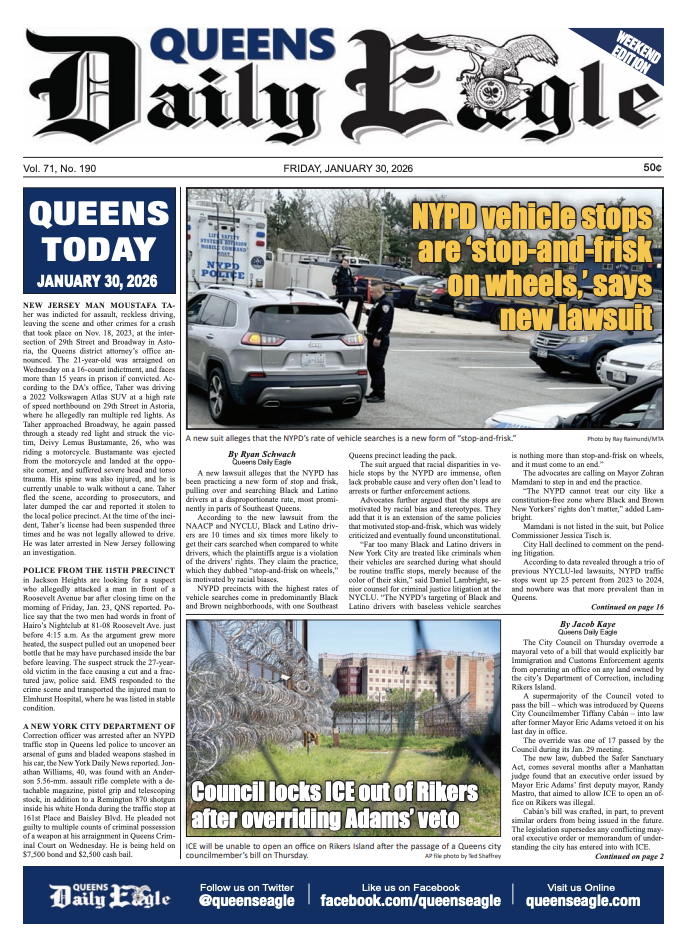Opinion: End cash bail while forgoing risk assessment tools
/Andrea Colon. Photo courtesy of Colon.
By Andrea Colon
Special to the Eagle
Cash bail payments allow an individual accused of a crime to leave jail while they wait months or years for their case to go to court.
In exchange for a payment to the court, defendants can wait for their trials in the comfort of their own homes. Currently, the status quo gives the wealthy the privilege of waiting for their trials from home. If you are poor and cannot afford bail, cash bail penalizes you before you are judged guilty. It creates two systems of justice — one for the wealthy and one for the poor.
To solve this inequality, the United States should adopt a policy that eliminates the use of bail for all crimes. Instead, non-monetary alternatives such as check-ins with the court, curfews, technology such as email and text to send frequent reminders to the accused about upcoming court dates, monitoring where possible and necessary and other pretrial services should be used.
The current system discriminates against poor people. Fundamentally, it is wrong to detain a defendant simply because they cannot afford their freedom. This system disproportionately impacts low-income people, particularly low-income people of color. People who cannot afford bail choose one of two routes: plead guilty and end up with a record or be held in detention and risk losing your job and housing. There's also evidence that pretrial detention is more likely to lead to convictions since people take plea deals even if they're not guilty.
Pre-trial detention takes a defendant away from their family and community, which has long-lasting effects. This can impact someone’s living situation and mental health. Between 1999 and 2014, the number of people held in jail before trial ballooned, accounting for 99 percent of the total growth of America’s jailhouse population. The criminal legal system is not equal. It targets poor people who cannot afford their freedom.
An alternative to bail that is often recommended is the risk-based assessment. Risk-based assessments rely on algorithms that allegedly estimate the risk that the person will be re-arrested or miss a court date if released pretrial.
But there is a flaw in this system. People who create these algorithms have their own biases, which are perpetuated in the technology that they design. For example, the algorithm may not explicitly include race or income, but other factors such as names or zip codes can lead to an assumption.
“Black defendants who did not re-offend were more likely to have been classified as high risk than white defendants,” according to a ProPublica study regarding risk assessments, Black and white people around the United States are arrested at disparate rates, partly due to biased policing, so Black people are more likely to have arrests on their records.
An algorithm that predicates the likelihood of reoffending based on arrest records perpetuates those same racial disparities. Race and socioeconomic status are two issues that intersect due to the nature of the racial wealth gap that is due to the historical oppression of people of color. We must be intentional when setting policies that could continue to negatively impact those who have been most affected by policies such as bail.
The policy that I am proposing is a bill passed by the federal legislature that would end the use of bail in the federal court system and require that all states eliminate bail in all tiers of their court system.
The vast majority of defendants should be released with no conditions except making all court appearances, and make very limited use of pretrial detention. There should be check-in calls with officers and texted court reminders — studies have shown these can significantly improve court appearance rates — as well as helping people attend court by offering transportation. These tactics will allow low-income people to remain stable in their communities. Elected officials must be accountable to their constituents.
Call your elected officials and voice your concerns with our country’s unjust legal system. Change starts with you.
Andrea Colon is an organizer with the Rockaway Youth Task Force.




